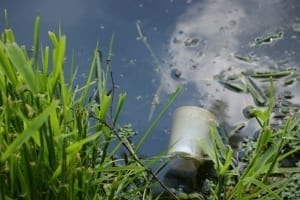Over the years, the activities of fishermen, traders and tourists along the coastline of Cameroon have put the health of sea birds, reptiles, fish and sea mammals and human beings in jeopardy.
On a daily basis, waste material generally referred to as marine litter is generated comprising plastic bags, plastic bottles, cigarette stumps, old clothes and abandoned fishing gear. Most of these items are non-biodegradable in nature and sometimes are washed into the sea from residential areas or simply disposed of by ships. Environment experts say consumption of plastic waste by aquatic animals could leads to entanglement, bloating, poisoning and death of such faunae. Some of these sea creatures mistake plastic bags for jellyfish. The toxic contents of these plastics have been linked to the suppressed immune systems and reduced reproductive rate of sea creatures. Also, when contaminated sea food is poorly cooked and consumed by humans, the health implications are severe. In a bid to tackle the problem of poor waste disposal and management on the beaches of Limbe, the City Council has recruited the services of a waste disposal company to meticulously clean this tourist destination. Besides, pro-environment Non-Governmental Organizations carry out regular beach cleaning campaigns. Unfortunately, these efforts are sometimes thwarted by the unsanctioned habits of some tourists who fail to drop rubbish mostly plastics in garbage cans. Also some commercial fishermen upon return from fishing trips litter the shores with marine debris picked up by their fishing nets. While talking to our reporter, a fisherman, Johannes admitted that ‘at times we go fishing and end up filling our nets with more dirt than fish. When we bring our nets to the sea shore, we take time to remove such dirt and drop here because we have people who clean the beach every day. They are paid to do that’.These fishermen are entrapped in a vicious circle of ‘catching’ litter they previously dumped on the sea shores.
While the activities of fishermen and tourists contribute to the heaps of waste, the refuse disposal habits of slum dwellers greatly amplify the problem. The Chief of Bureau for Maritime Transport in LimbeMoki Martin says most of the litter that ends up in places like ‘Down beach’ Limbe comes from nearby creeks. ‘Some people especially fishermen have illegally constructed their houses along the creeks in Limbe and Tiko and they dispose of their household waste in these creeks. When it rains heavily, the dirt is dragged into the Atlantic Ocean as the streams empty themselves,’ notes Moki Asked to comment about the waste disposal habits of sea vessels occupants, Moki said ‘many people think it is ships that pollute the sea, this is not the case because our office works closely with ships and we control even their waste baskets and they know that the penalties are high if they are caught polluting’. In line with the International Convention for the Prevention of Pollution from Ships (MARPOL), experts of the Divisional Delegation of Environment in Fako ensure the prevention of oil pollution through rigorous checks of ships that anchor in the West Coast. One of the officers in charge of environmental control, TiwaZacharie says ‘during our operations, we find out if kitchen waste is treated before being disposed of in the sea. We also control the waste oil in their slush tanks as well as the sewage. To ensure that the sea waters are not polluted by waste oil from their engines, ships that successfully anchor with such waste are hooked up to certified waste disposal companies’. It is worth noting that each year thousands of sea turtles and sea mammals are harmed because of plastic waste and water pollution. Moreover, the human food chain is not spared as disintegrated plastics ingested by fish end up on dining tables.






